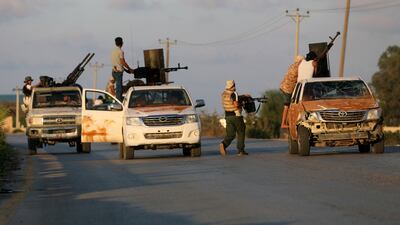A powerful government-backed militia in Libya has threatened to sue Amnesty International over a report accusing it of killings, torture and forced labour.
Amnesty accused the Stability Support Authority of a string of abuses in a report released on Wednesday. These included "unlawful killings, arbitrary detentions, interception and subsequent arbitrary detention of migrants and refugees, torture, forced labour, and other shocking human rights violations".
The SSA said on Thursday it "upholds Libyan law" and holds its members accountable for "any illegal act".
The group also said it "reserves the right to sue Amnesty International for defamation and slander against the Libyan state and its official institutions".
Amnesty said the violations were committed against Libyans as well as migrants and refugees who travelled to Libya in hopes of making a boat crossing to Europe.
The SSA, created under a decree by former prime minister Fayez Al Sarraj in January last year, is led by Abdel Ghani Al Kikli, one of the most powerful men in the North African country's capital Tripoli.
Amnesty said Mr Al Kikli, known as "Gheniwa", had been appointed despite a "well-documented history of crimes under international law and other serious human rights violations committed by militias under his command".
Libya plunged into violent lawlessness in 2011 after a popular uprising that toppled and killed longtime dictator Muammar Qaddafi.
Armed groups have fought for territory while seeking influence and a share of the country's oil wealth through affiliations with rival political groups.
Many such groups have been integrated into the state despite accusations of abuse by human rights organisations.
In March, United Nations investigators said serious rights violations, including possible crimes against humanity, were continuing with impunity across much of Libya.
A UN-led peace process failed to deliver promised elections in December amid disputes over the process.

